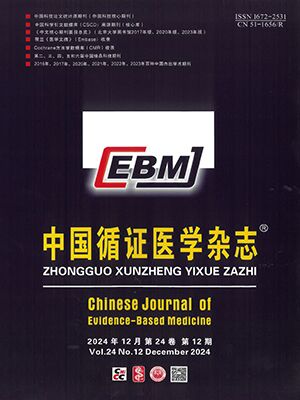| 1. |
Faulkner G, Fagan MJ, Lee J. Umbrella reviews (systematic review of reviews). Int Rev Sport Exerc Psychol, 2021. DOI:10.1080/1750984X.2021.1934888.
|
| 2. |
Pollock M, Fernandes RM, Becker LA, et al. Chapter Ⅴ: overviews of reviews. In: Higgins JPT, Thomas J, Chandler J, et al (editors). Cochrane handbook for systematic reviews of interventions version 6.2. The Cochrane Collaboration, 2021. Available at: http://www.cochrane-handbook.org.
|
| 3. |
刘海霞, 胡德华, 尹怀琼. 伞形评价—一种新型循证医学分析方法. 中华流行病学杂志, 2020, 41(2): 261-266.
|
| 4. |
Li M, Liu Y, Wang H, et al. The effects of acupuncture on pregnancy outcomes of recurrent implantation failure: a systematic review and meta-analysis. Evid Based Complement Alternat Med, 2021, 2021: 6661235.
|
| 5. |
Xie ZY, Peng ZH, Yao B, et al. The effects of acupuncture on pregnancy outcomes of in vitro fertilization: a systematic review and meta-analysis. BMC Complement Altern Med, 2019, 19(1): 131.
|
| 6. |
Coyle ME, Stupans I, Abdel-Nour K, et al. Acupuncture versus placebo acupuncture for in vitro fertilisation: a systematic review and meta-analysis. Acupunct Med, 2021, 39(1): 20-29.
|
| 7. |
Schwarze JE, Ceroni JP, Ortega-Hrepich C, et al. Does acupuncture the day of embryo transfer affect the clinical pregnancy rate. Systematic review and meta-analysis. JBRA Assist Reprod, 2018, 22(4): 363-368.
|
| 8. |
Higgins JPT, Green S. Cochrane handbook for systematic reviews of interventions (version 5.0.2). The Cochrane Collaboration, 2009. Available at: http://www.cochrane-handbook.org.
|
| 9. |
Hartling L, Chisholm A, Thomson D, et al. A descriptive analysis of overviews of reviews published between 2000 and 2011. PLoS One, 2012, 7(11): e49667.
|
| 10. |
刘雅莉, 袁金秋, 杨克虎, 等. 系统评价再评价的制作方法简介及相关资料分析. 中国循证儿科杂志, 2011, 6(1): 58-64.
|
| 11. |
Zhu J, Yu X, Zheng Y, et al. Association of glucose-lowering medications with cardiovascular outcomes: an umbrella review and evidence map. Lancet Diabetes Endocrinol, 2020, 8(3): 192-205.
|
| 12. |
Jin YH, Wang GH, Sun YR, et al. A critical appraisal of the methodology and quality of evidence of systematic reviews and meta-analyses of traditional Chinese medical nursing interventions: a systematic review of reviews. BMJ Open, 2016, 6(11): e011514.
|
| 13. |
Hu C, Qin X, Ye R, et al. The role of traditional Chinese medicine nursing for stroke: an umbrella review. Evid Based Complement Alternat Med, 2021, 2021: 9918687.
|
| 14. |
Guyatt G, Oxman AD, Akl EA, et al. GRADE guidelines: 1. Introduction-GRADE evidence profiles and summary of findings tables. J Clin Epidemiol, 2011, 64(4): 383-394.
|
| 15. |
Shea BJ, Reeves BC, Wells G, et al. AMSTAR 2: a critical appraisal tool for systematic reviews that include randomised or non-randomised studies of healthcare interventions, or both. BMJ, 2017, 358: j4008.
|
| 16. |
Theodoratou E, Tzoulaki I, Zgaga L, et al. Vitamin D and multiple health outcomes: umbrella review of systematic reviews and meta-analyses of observational studies and randomised trials. BMJ, 2014, 348: g2035.
|
| 17. |
Thomas J, Kneale D, McKenzie JE, et al. Chapter 2: Determining the scope of the review and the questions it will address. In: Higgins JPT, Thomas J, Chandler J, et al (editors). Cochrane handbook for systematic reviews of interventions version 6.2. The Cochrane Collaboration, 2021. Available at: http://www.cochrane-handbook.org.
|
| 18. |
Ortega A, Lopez-Briz E, Fraga-Fuentes MD. From qualitative reviews to umbrella reviews. In: Biondi-Zoccai G (editors). Umbrella reviews. Cham: Springer, 2016.
|
| 19. |
Aromataris E, Fernandez R, Godfrey CM, et al. Summarizing systematic reviews: methodological development, conduct and reporting of an umbrella review approach. Int J Evid Based Healthc, 2015, 13(3): 132-140.
|
| 20. |
Neuenschwander M, Ballon A, Weber KS, et al. Role of diet in type 2 diabetes incidence: umbrella review of meta-analyses of prospective observational studies. BMJ, 2019, 366: l2368.
|
| 21. |
Bi H, Gan Y, Yang C, et al. Breakfast skipping and the risk of type 2 diabetes: a meta-analysis of observational studies. Public Health Nutr, 2015, 18(16): 3013-3019.
|
| 22. |
Radua J, Ramella-Cravaro V, Ioannidis JPA, et al. What causes psychosis. An umbrella review of risk and protective factors. World Psychiatry, 2018, 17(1): 49-66.
|
| 23. |
Poole R, Kennedy OJ, Roderick P, et al. Coffee consumption and health: umbrella review of meta-analyses of multiple health outcomes. BMJ, 2017, 359: j5024.
|
| 24. |
O'Sullivan JW, Muntinga T, Grigg S, et al. Prevalence and outcomes of incidental imaging findings: umbrella review. BMJ, 2018, 361: k2387.
|
| 25. |
Pieper D, Antoine SL, Mathes T, et al. Systematic review finds overlapping reviews were not mentioned in every other overview. J Clin Epidemiol, 2014, 67(4): 368-375.
|
| 26. |
Howes OD, Whitehurst T, Shatalina E, et al. The clinical significance of duration of untreated psychosis: an umbrella review and random-effects meta-analysis. World Psychiatry, 2021, 20(1): 75-95.
|
| 27. |
Fusar-Poli P, Radua J. Ten simple rules for conducting umbrella reviews. Evid Based Ment Health, 2018, 21(3): 95-100.
|




